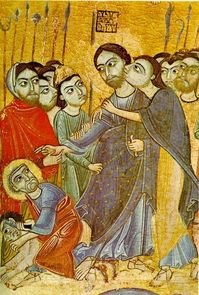A reader e-mailed me the following, with this note: “I have not seen much commentary on the current troubles in our church from faithful members of other ecclessial communities. No piling on by Methodists, Lutherans, Presbyterians, Anglicans etc. They are well aware of their own failings and many admire the Catholic churches record on social justice issues.”
Here, then, a snip from an essay by Rev. Dr. Serene Jones, president of the Union Theological Seminary:
Tears come easily when I think of the abuse and the horrifying realization that some within the church clearly believe that protecting priests is more important than safeguarding children. When I think of Jesus suffering during Holy Week, it is the broken bodies of children, betrayed by their own religious leaders, that come to mind. They bear the crosses of the church’s abuses of power.
That said, I also weep because this latest sex scandal adds to our distrust of religious leadership in general and keeps us from remembering all the good work the Roman Catholic church does for the poor, hungry, and homeless, and has done for many decades. I am personally indebted to countless nuns and priests I’ve encountered over the years, who patiently taught me what it means to “stand with the least of these.” In the twentieth century, especially, it was Roman Catholics rather than liberal, so-called “Main Line” Protestants who more often found spiritual grounds for social justice.
I think of Dorothy Day and the Catholic Worker Movement that began during the depths of the Great Depression, and which continues today to give care and comfort to the forsaken. I think of Thomas Merton and his outspoken protest of the Vietnam War. I think of the Catholic bishops who stood side by side with César Chávez in his fight for justice among the farm workers of California’s Central Valley. I think of Archbishop Óscar Romero and the struggles of San Salvador. And I think of blighted neighborhoods across America where all-but-ignored nuns, priests, and committed laypeople offer hope to the nearly hopeless through soup kitchens, schools, and community centers. For them, and for energetic Catholic women I work with and teach — so unjustly banned from a priesthood that sorely needs them — the importance of justice-making always exceeds the importance of collars and confessions.
Tragedies come and go; issues like labor and immigration burn bright in the public consciousness for a time and then are forgotten. Long after the rest of the world has moved on, however, often enough the Catholic Church alone continues to affirm economic justice, offer a moral critique of capitalism, and, most importantly, insist that a radical love of the powerless and marginalized is the truest form of faith.
[snip]
As a Protestant, I refuse to throw self-righteous stones against Catholics. Disregard for public accountability is dangerous, in any form. It is not only in politics that power corrupts, and absolute power corrupts absolutely. No church is immune. No person is.
The Catholicism I cherish — and the Catholicism that the world so desperately needs — is one that models an unguarded honesty about human failing, a gentleness of spirit that welcomes criticism, and a determination to hold all people, no matter their station, accountable for their actions.
This is the lesson of Holy Week, and it is one that Christians all — bishops, popes, and pew-sitters alike — would do well to consider carefully in the days ahead.
Check out the rest here.

